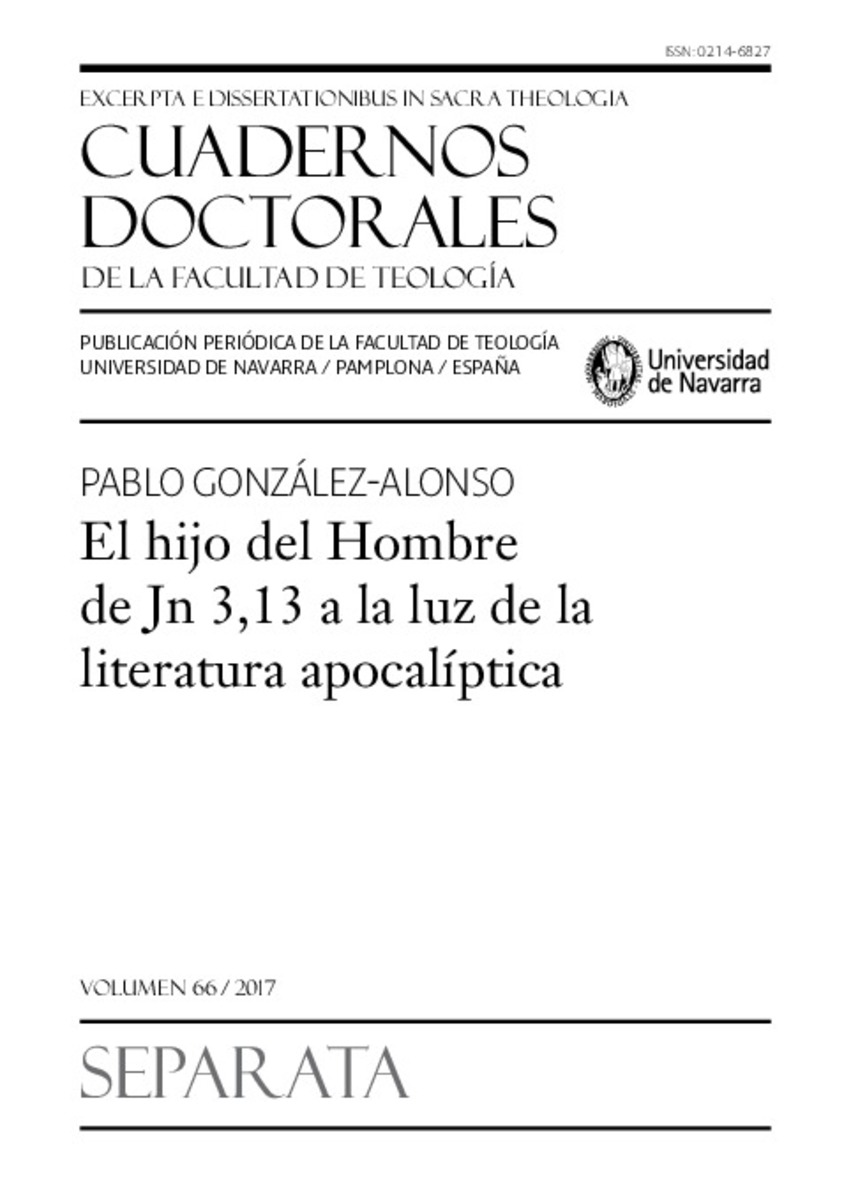Full metadata record
| DC Field | Value | Language |
|---|---|---|
| dc.creator | González-Alonso, P. (Pablo) | - |
| dc.date.accessioned | 2018-01-15T13:44:04Z | - |
| dc.date.available | 2018-01-15T13:44:04Z | - |
| dc.date.issued | 2017 | - |
| dc.identifier.citation | González-Alonso, P. (Pablo) | es |
| dc.identifier.issn | 0214-6827 | - |
| dc.identifier.uri | https://hdl.handle.net/10171/45737 | - |
| dc.description.abstract | Las palabras de Jesús en el diálogo con Nicodemo: «Nadie ha subido al cielo, sino el que bajó del cielo, el Hijo del Hombre» (Jn 3,13) parecen contradecir la tradición judía que asume los ascensos al cielo de patriarcas o profetas como Henoc, Elías, etc. Así lo sugiere el pronombre «nadie». El presente trabajo se propone ayudar a comprender mejor esta afirmación. En primer lugar se determina el contexto de 3,13 en la estructura del evangelio de Juan y se analiza el uso paralelo de los verbos y expresiones más relevantes de este versículo en el cuarto evangelio. A continuación, se presentan los relatos de ascensos al cielo en la literatura judía apocalíptica y la figura del Hijo del Hombre. Seguidamente, se proponen las características del Hijo del Hombre joánico y las posibles relaciones con el Hijo del Hombre y los viajeros celestiales apocalípticos. Finalmente, se analiza cómo este texto ha sido recibido por los Padres y autores eclesiásticos de los siglos II y III. El trabajo en su conjunto muestra la continuidad del evangelio con la tradición literaria anterior, al mismo tiempo que destaca la novedad de la figura de Jesús y la autoridad de su mensaje de salvación. | es_ES |
| dc.description.abstract | The words of Jesus in dialogue with Nicodemus: «No one has ascended to heaven but he who descended from heaven, the Son of Man» (Jn 3:13) seem to contradict the Jewish tradition that assumes the ascent to heaven of patriarchs or prophets like Enoch, Elijah, etc. This is suggested by the phrase «no one». This paper aims to better understand this statement. First, the context of 3:13 in the structure of the Gospel of John is determined, and the parallel use of verbs and most relevant expressions of this verse in the fourth gospel are analyzed. Then the accounts of ascents to heaven in Jewish apocalyptic literature and the figure of the Son of Man are presented. Next, the features of the Johannine Son of Man and possible relations with the apocalyptic Son of Man and celestial travelers are proposed. Finally, it is discussed how this text has been received by the Fathers and ecclesiastical authors of the 2nd and 3rd centuries. The work as a whole shows the continuity of the Gospel with the previous literary tradition, while highlighting the novelty of the figure of Jesus and the authority of his message of salvation. | es_ES |
| dc.language.iso | spa | es_ES |
| dc.publisher | Servicio de Publicaciones de la Universidad de Navarra | es_ES |
| dc.rights | info:eu-repo/semantics/openAccess | es_ES |
| dc.subject | Hijo del Hombre | es_ES |
| dc.subject | Ascenso – descenso | es_ES |
| dc.subject | Apocalíptica | es_ES |
| dc.subject | Son of Man | es_ES |
| dc.subject | Ascent – descent | es_ES |
| dc.subject | Apocalyptic | es_ES |
| dc.title | El hijo del Hombre de Jn 3,13 a la luz de la literatura apocalíptica | es_ES |
| dc.type | info:eu-repo/semantics/article | es_ES |
| dc.publisher.place | Pamplona | es_ES |
| dadun.citation.endingPage | 81 | es_ES |
| dadun.citation.publicationName | Cuadernos Doctorales de la Facultad de Teología. Excerpta e Dissertiationibus in Sacra Theologia | es_ES |
| dadun.citation.startingPage | 5 | es_ES |
| dadun.citation.volume | 66 | es_ES |
Files in This Item:
Statistics and impact
Items in Dadun are protected by copyright, with all rights reserved, unless otherwise indicated.






